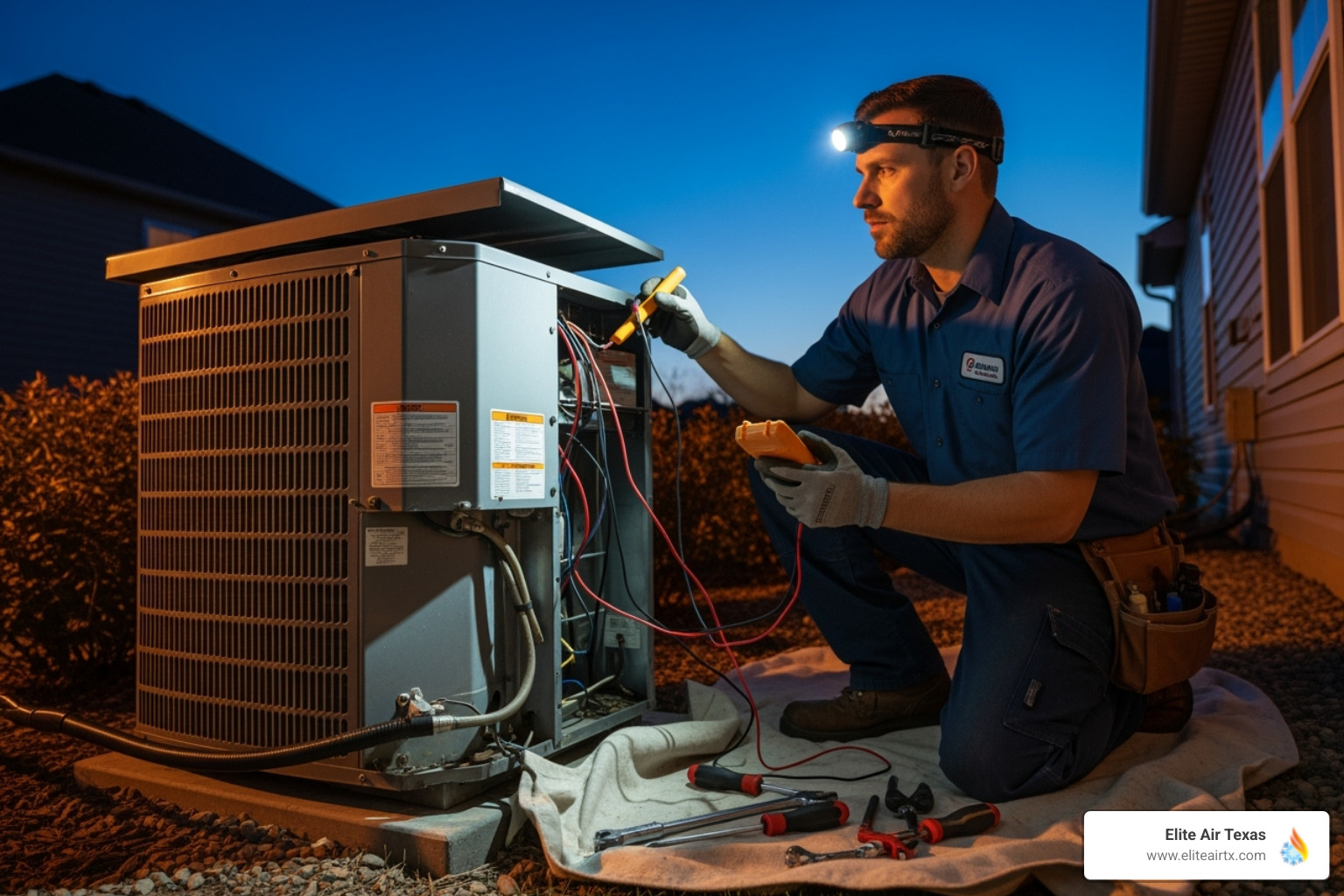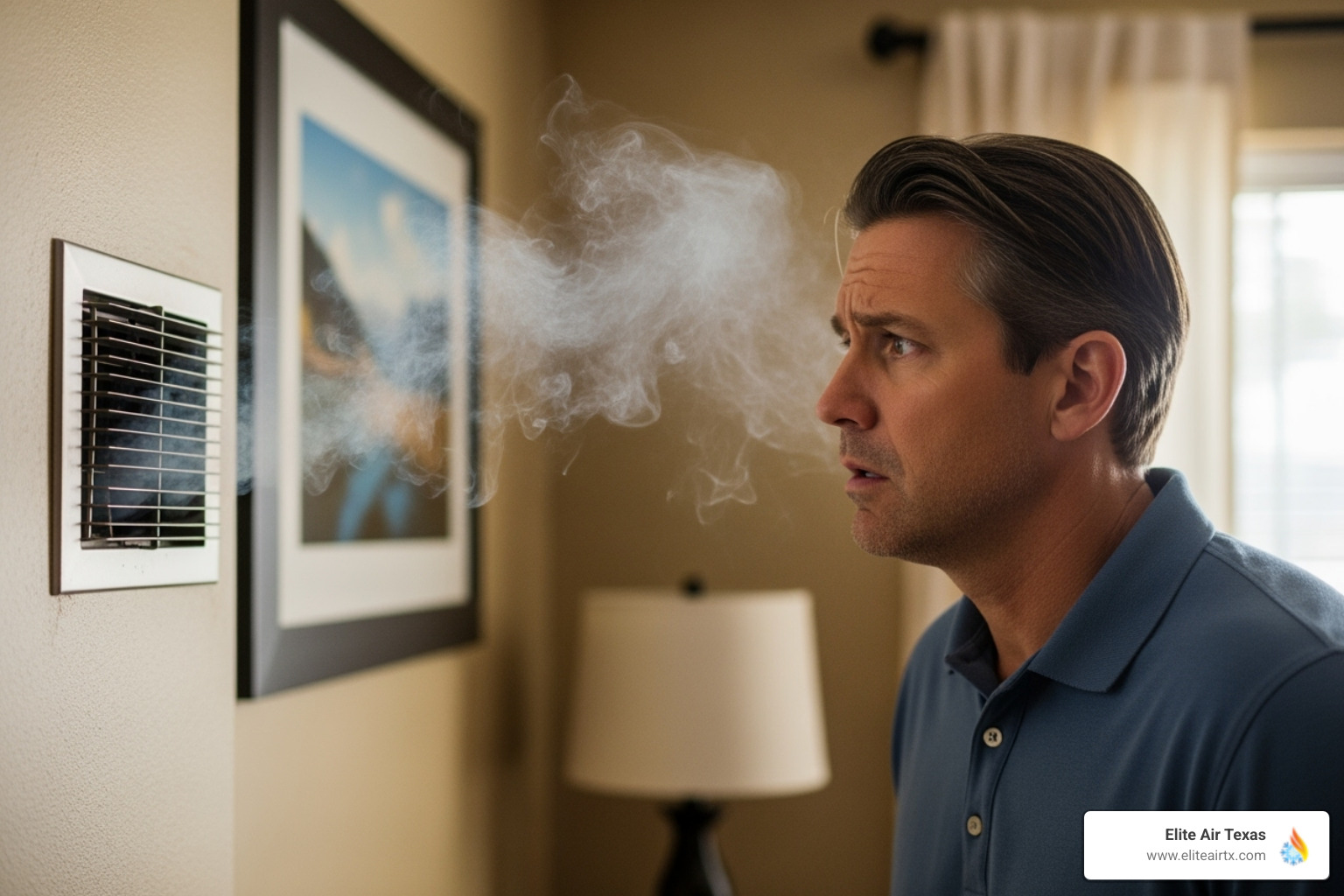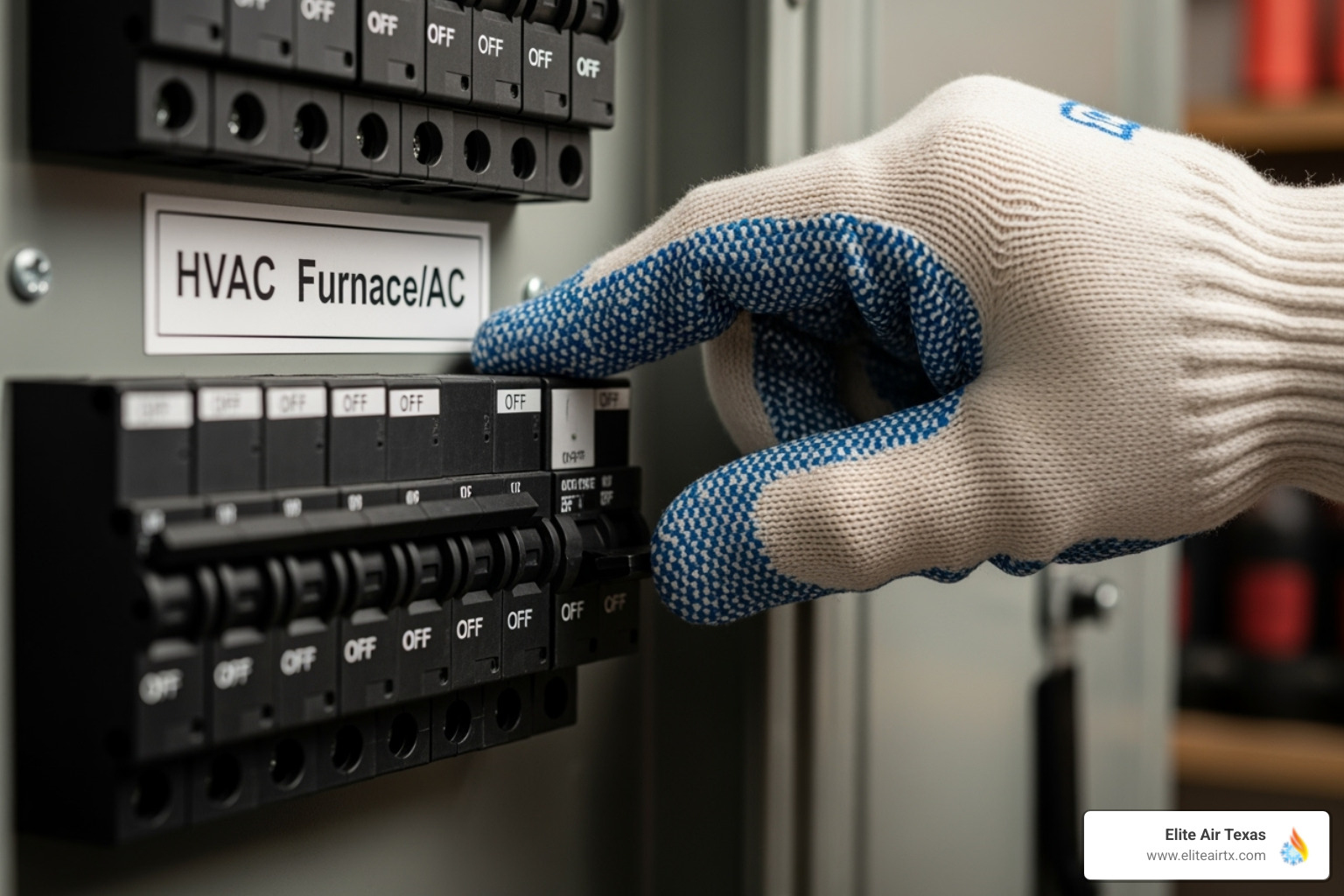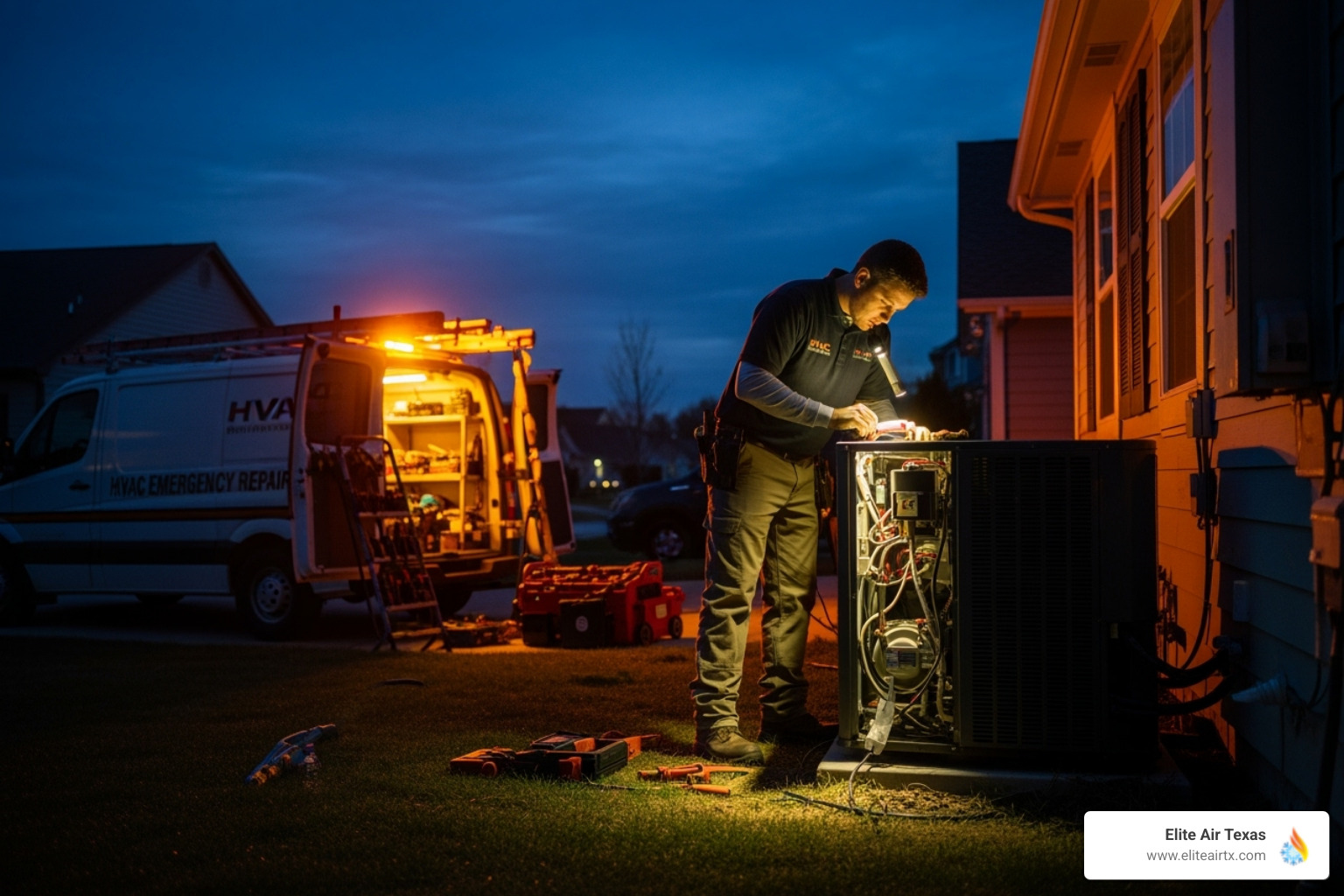
The Ultimate Guide to Emergency HVAC Repair: When Every Second Counts
October 10, 2025

Why HVAC Emergencies Demand Immediate Attention
When your air conditioner quits during a scorching Texas summer or your furnace fails on a freezing winter night, you need hvac emergency repair near me fast. These aren't just inconveniences—they're urgent situations that can threaten your family's safety and comfort.
Need emergency HVAC help right now? Here's what to do:
- Check for immediate dangers: If you smell gas or your carbon monoxide alarm goes off, evacuate immediately and call 911. Then, contact an HVAC professional.
- Turn off your system: Switch off the unit at the thermostat and the circuit breaker to prevent further damage.
- Call a 24/7 emergency service: Look for licensed, insured technicians with fast response times in your area.
- Stay safe while waiting: Use portable fans or heaters only if it's safe, and keep vulnerable family members comfortable.
HVAC systems often fail at the worst possible times. While simple fixes can be relatively inexpensive, more complex issues like compressor failures can cost significantly more. But the real cost isn't just financial—when temperatures reach dangerous levels, a broken HVAC system becomes a health emergency.
The good news is that most emergencies show warning signs before a complete failure. Recognizing these signs early can help you act quickly and potentially prevent a full breakdown.
Common HVAC Emergency Warning Signs:
- Safety Threats: Gas smell, burning odor, carbon monoxide alarm.
- Cooling Failures: No cold air, refrigerant leaks, water pooling near the unit.
- Heating Failures: No heat, yellow pilot light, strange sounds from the furnace.
- System Issues: Frequent cycling, unusually high energy bills, weak airflow.
This guide will walk you through everything you need to know about HVAC emergencies—from identifying these critical signs to finding reliable help fast. You'll learn when to call for immediate service, what to ask technicians, and how to prevent future breakdowns.
What is an HVAC Emergency? Recognizing the Critical Warning Signs

Let's be honest—when your AC dies in July or your heater quits during a cold snap, it feels like an emergency. But what truly qualifies as a situation needing hvac emergency repair near me? An HVAC emergency is any situation that threatens your safety, health, or property. Extreme temperatures can be dangerous, especially for older adults, young children, and those with chronic health conditions. According to health and safety information from HEAT.gov, a heat index above 90°F is dangerous, and a lack of heat during a freeze can lead to hypothermia. Recognizing the warning signs early is key.
Signs of a Cooling Emergency
When the Texas sun is blazing, these signs demand immediate attention:
- No Cool Air: The most obvious red flag is when your AC is running but blowing warm or room-temperature air.
- Refrigerant Leaks: Hissing sounds or ice forming on the refrigerant lines or coils indicate a leak, which is both harmful to the environment and your system.
- Water Leaks: Puddles of water around your indoor unit can signal a clogged drain line or frozen coil, leading to water damage and mold.
- Loud Noises: Grinding, squealing, or banging sounds often point to serious mechanical failures, like a problem with the motor or compressor.
- Strange Smells: A burning smell can indicate an electrical issue, while a musty odor may mean mold is growing in your system.
- Short Cycling: If your AC turns on and off frequently without completing a full cooling cycle, it's a sign of an underlying problem.
During peak summer heat, any of these issues can quickly escalate. Don't wait—call for emergency help. For more details on urgent cooling problems, check out our guide on AC Problems That Need Emergency Response.
Signs of a Heating Emergency
A working heater is essential during a Texas cold snap. A heating emergency can be every bit as dangerous as a cooling one.
- No Heat: If your furnace won't turn on or is only blowing cold air, your home can become dangerously cold in hours.
- Gas Smell: If you smell gas (like rotten eggs), evacuate your home immediately and call 911 from a safe distance. Do not use any electronics or light switches.
- Carbon Monoxide Alarm: If your CO detector goes off, treat it as a real emergency. Evacuate and call 911. A faulty furnace can leak this odorless, deadly gas.
- Yellow Pilot Light: A pilot light on a gas furnace should be a steady blue. If it's yellow or flickering, it could indicate a ventilation problem and potential carbon monoxide risk.
- Loud Noises: Banging, scraping, or screeching sounds can signal a problem with the blower motor, burner, or other mechanical parts.
When you're facing any of these heating emergencies, quick action is critical. We're here to help with all your heating needs, including Emergency Heater Repair Dallas, TX.
Your Immediate Action Plan: What to Do in an HVAC Emergency

When your HVAC system fails, a few calm, measured steps can protect your family and prevent further damage while you search for hvac emergency repair near me. Your safety always comes first.
Step 1: Prioritize Safety
Some HVAC issues are genuine safety threats.
- Gas Smell or CO Alarm: If you smell gas or your carbon monoxide detector goes off, evacuate everyone from the house immediately. From a safe distance, call 911. Do not use any electronics or light switches inside.
- Burning Smell or Sparks: This indicates a serious electrical problem. Turn off your system at the thermostat, then shut off the corresponding circuit breaker. This can prevent a fire.
- Water Leaks or Loud Noises: For major water leaks, loud banging, or violent shaking, turn the system off at the thermostat and the breaker to prevent more damage.
Step 2: Perform Basic Troubleshooting
Once you've addressed any immediate safety concerns, a few quick checks might solve the problem or provide valuable information for your technician.
- Check the Thermostat: Ensure it's set to "cool" or "heat" and the temperature is correct. If it's battery-powered, try replacing the batteries.
- Inspect the Air Filter: A severely clogged air filter can restrict airflow and cause your system to shut down. Check it and replace it if it's dirty.
- Check the Circuit Breaker: Find the breaker for your HVAC system. If it has tripped, flip it off and then on again. If it trips again right away, leave it off and call a professional, as this signals an electrical fault.
- Clear Vents and Units: Make sure all supply and return vents inside are open and unblocked by furniture or drapes. Outside, ensure the condenser unit is clear of leaves, grass clippings, and other debris.
If these steps don't resolve the issue, it's time to call for professional help. For more tips, see our guide on Solving Common AC Emergency Issues. Elite Air Texas is available 24/7 to restore your comfort and safety.
How to Find a Reliable 24/7 HVAC Emergency Repair Near Me
When your HVAC system gives up the ghost at 2 AM, you need help—fast. But choosing the right company is crucial to avoid shoddy work or inflated prices. Here’s how to find a reliable hvac emergency repair near me service, even when you're under pressure.
At Elite Air Texas, we've built our reputation on being there when our neighbors need us most—across Aledo, Arlington, Weatherford, Dallas, Fort Worth, Granbury, Benbrook, and throughout North Texas.
What to Look for and What to Ask
When you're searching for an emergency HVAC service, keep these key factors in mind and ask the right questions before you hire.
- True 24/7 Availability: Does a real person answer the phone, day or night? Can they dispatch a technician immediately? Ask: "How quickly can you get a technician to my home?" You need a clear timeframe.
- Licensed and Insured: This is non-negotiable. It protects you and ensures the technician is qualified.
- Positive Customer Reviews: Check recent reviews on Google, Yelp, and Facebook. Look for comments on responsiveness, professionalism, and clear communication.
- Local Presence: A local company, like Elite Air Texas, knows the area, understands local codes, and can get to you faster. We're proud to serve communities from Granbury to North Richland Hills because we're your neighbors.
- System Experience: HVAC systems vary. Ask: "Are your technicians trained on my brand and type of system?"
- Guarantees and Warranties: A reputable company stands by its work. Ask: "What kind of guarantee do you offer on your repairs?" At Elite Air Texas, we offer a 10-year labor warranty on new installations because we're confident in our craftsmanship.
- Transparent Process: You should be in control. Ask: "Will you explain the problem and my options before starting work?" A professional will always get your approval before proceeding.
Taking a few minutes to ask these questions can save you time, money, and stress. For more information about finding round-the-clock service, visit our guide on 24 Hour HVAC Repair Near Me. For emergency services in specific areas like Arlington, we're ready to help—learn more about HVAC Emergency Repair Arlington, TX.

The Repair Process: What to Expect and Key Questions to Ask
When an Elite Air Texas technician arrives for an emergency call, they will first ensure the area is safe, then perform a comprehensive diagnostic. Be ready to share what you've noticed—strange sounds, smells, or when the problem started. These details are valuable clues. Once the issue is identified, our technician will explain the problem in plain English and walk you through your options.
Emergency Services vs. Routine Maintenance
It's important to know the difference between these two services:
- Emergency Repair: This is a reactive service focused on fixing an immediate, urgent problem. When you call for hvac emergency repair near me, the goal is to get your system running again safely and quickly to restore comfort and safety.
- Routine Maintenance: This is proactive, preventative care. Scheduled tune-ups, cleanings, and inspections help prevent breakdowns, improve efficiency, and extend your system's lifespan. An annual check-up is the best way to avoid a crisis. When a system goes more than 12 months without a professional tune-up, the risk of costly breakdowns increases significantly.
While our technician will fix the immediate problem, they may also recommend follow-up maintenance to prevent it from happening again. We're here for both scenarios, including specialized services like Emergency AC Repair Benbrook, TX.
Key Questions for Your Technician
Don't hesitate to ask questions. An informed homeowner makes the best decisions. Here are a few key questions to ask:
- What is the specific problem and what caused it?
- What are my repair options, and what are the pros and cons of each?
- What is the expected lifespan of this repair?
- Can this problem be prevented in the future, and if so, how?
- Do you offer any guarantees or warranties on this repair?
At Elite Air Texas, we stand behind our work and believe in transparency. We want you to feel completely confident in the solution we provide—we even offer free second opinions to ensure you're getting the right advice. Whether you're dealing with a heating crisis and need Emergency Heater Repair Fort Worth, TX, or any other urgent HVAC issue, our team is ready to answer your questions and restore your comfort quickly.
Repair vs. Replacement: Making the Right Call in a Crisis
In some HVAC emergencies, a simple repair isn't the most cost-effective or sensible long-term solution. When faced with a critical breakdown, your technician might recommend a full system replacement. This can be a tough decision, especially under pressure, but knowing the key factors can help you make the best choice for your home and budget.
While a new HVAC system is a significant investment, repeatedly paying for repairs on an old, inefficient unit can be more expensive in the long run. We aim to provide affordable comfort, and sometimes that means recommending a new, more efficient system that will save you money over time.
Here's a table comparing factors to consider when deciding between repair and replacement:
| Factor | Consider Repair If... | Consider Replacement If... |
|---|---|---|
| System Age | Your system is less than 10-12 years old and has been well-maintained. | Your AC is over 10 years old or your furnace is over 15. Older systems are more prone to failure. |
| Repair Frequency & Cost | This is the first or second major repair. The repair cost is less than half the price of a new unit. | You're calling for repairs every year. The cost of the repair is approaching 50% of a new system's value. |
| Energy Efficiency | Your energy bills have been stable and reasonable. | Your energy bills have been steadily climbing. New systems are significantly more efficient, saving you money every month. |
| Long-Term Value | You plan on moving in the next few years and just need a functional system. | You want long-term reliability, a new warranty (we offer a 10-year labor warranty!), and improved home comfort. |
Making this decision during an emergency can be stressful. For a deeper look, read our guide on When to Consider Emergency AC Replacement.
Ready to Enhance Your Comfort?
Contact our experts today to discover tailored HVAC solutions that fit your needs perfectly.


%201.svg)

